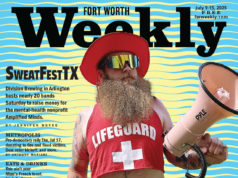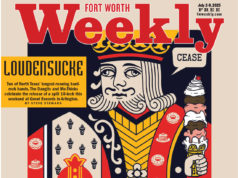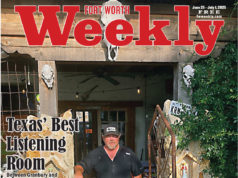Here’s a split EP released on cassette (!) and digital download that features six tracks of raging, lo-fi punk rock thrills, with a virulence that I haven’t heard in these parts for quite awhile. Between these two bands, Doom Ghost and War Party, and The Fungi Girls, it’s almost as if some sort of sub-generational groundswell is taking place here.
I heard Doom Ghost first, when a friend sent me a link to their demos. I was knocked for a loop by their potent combination of ’60s garage grunt and melodic punk squall. I had the pleasure of witnessing them in live performance, which was even more feral than their demos had led me to expect. While my two favorite songs from those demos didn’t make this release, Love at First Fight, Vol. 1 (on War Party’s Lo-Life Recordings), the three that did make it still manage to say more in two minutes or fewer than any other music I’ve heard recently. My only gripe is that Doom Ghost sounds more minimalist in the studio than onstage, where they blow up against the back wall as if they mean to knock it down.
Producer Britt Robisheaux — who plays in The Theater Fire and Most Efficient Women and played in Drug Mountain and Nouns Group — got my attention with an advance spin of a War Party track, “Beginner’s Luck,” which reminded me of something I’d have bought as an import single back in 1973, when glam was all the rage. The track’s a winner from alpha to omega, with nifty guitar interplay, backing vocals, and a propulsive beat that just won’t quit. On reflection, the comparison that resonates is with The Replacements, based on War Party frontman Cameron Smith’s Westerbergian yelp and the band’s somewhat shambolic live presentation. In fairness, I saw ’em at The Chat Room, where I gather they’re regulars — they might have been a little more comfortable than usual on stage. The proximate sonic model there was The Velvet Underground (if Uncle Lou was actually having a good time).
What’s irresistible about both of these bands is the sheer cathartic energy and joy that they project, the distilled essence of the rawk that will never die. — Ken Shimamoto
Furrther
Fort Worth singer-songwriter Jacob Furr’s new EP, Farther Shores, might sound sharply out of place among the land-lubbing, salt-of-the-earth music you’re likely to encounter this far inland. As it turns out, Furr wrote much of the album while living a stone’s throw from San Francisco Bay.
Most of the lyrics, however, tell of the 25-year-old Fort Worth native’s return home last year.
Self-released in January, Farther Shores contains little of the quiet honkytonk or wanderlust of Furr’s two full-length albums, 2011’s Finches and 2009’s The Only Road. Instead he’s pieced together the EP with patient melodies, elegantly simple chord progressions, disciplined thematic writing, and hauntingly talented vocals.
At times, as during the album’s third song, “Farewell Old Friend,” Furr’s voice strikes a deeply introspective tone (think: Jeff Tweedy). On others, like the album’s slow, subdued final track, “Sunrise on the City,” Furr’s voice drops nearly to a whisper as he sings about ships returning to port after long stretches at sea, both musically and lyrically rounding out a seamlessly blended album that lacks only for length. — Matthew McGowan
Intentionally Cosmic
Once upon a time, I attempted to gig in Fort Worth with a non-jazz instrumental band before one of the musicians in said band complained, “We can’t play live without a vocalist. They’ll kill us!” “They” presumably being Cowtown music fans, who evidently like to hear some a-sangin’ with their music. But nobody threatened to kill Sub Oslo, a North Texas instrumental outfit that was internationally known at the time, or, later, Confusatron, a Fort Worth fusion band that replaced legendary F-Dub fusion masters Bertha Coolidge at the old Black Dog Tavern (R.I.P.).
And certainly no one’s homicidal over Drift Era, a singer-less Fort Worth quartet that’s been picking up higher-profile gigs since forming about a year ago and is helmed by multi-instrumentalist Jonathan O’Connor, who has a side project, JoCo, with Alan mastermind Chris Hardee. On Drift Era’s debut EP, Cosmic Intentions, and on stage, O’Connor and company purvey a sound equally evocative of dub reggae, shoegazy rock, and experimental noise. While such a blend has precedents on the local scene (the aforementioned Sub Oslo, the mostly forgotten Audiophiles), Drift Era is more than just the sum of its influences.
The players in Drift Era don’t surround you in a total environment and perform a sonic exorcism the way Sub Oslo did/does or just plain groove you to death in the manner of Confusatron. They don’t even try to rock the rafters with their effect-laden drone the way the Audiophiles did. But in its way, Drift Era’s sonic stew is even more insidious than any of their precursors’. The band crafts dreamy soundscapes that envelop the listener in a haze by combining the simplest of elements (minimalist beats, riffs that sound like fragments of songs, guitars cloaked in layers of echo and delay, the plaintive wheeze of a melodica, sampled voices and other ambient sounds).
At different times, Drift Era can sound like the spacey side of Japanese doom rockers Boris (“Goin’ the Way of the Tradewinds”), Jamaican dubmeister Augustus Pablo jamming in a garage in River Oaks (“Day After the Rapture Dub”), Radiohead channeling “Whole Lotta Love” (“The Critic Loved ’Em”), or Ennio Morricone in space (“Really Black Magic”). But the Drift Era guys never sound like anyone more than themselves, which is quite an accomplishment in these postmodern days. — K.S.
Trojan Pajammas
Say what you will about The Pajammas’ choice of musical style — you can’t deny that these four Fort Worthians possess the chops to span the full punk spectrum. And their talent is on full display on the six-track Remnants of Fallen Walls, the band’s third album, released in late December. The dizzying, ruthless tempos of drummer Blake Brown stand out most throughout the album. Guitarists Ryan Danford and Owen Kinser also shred impressively on various tracks.
Remnants also demonstrates a refreshing flexibility, each song sonically referencing a different point on the punk timeline, from the frenzied and unpredictable ready-set-mosh beat of “Our Regards” to the angsty two-minute-long emo ode “Out Towards the Sea,” everything sprinkled with a little ska.
In addition to showcasing hyper-advanced technical skills, The Pajammas also have infused the whole album with a nice — if odd — touch of substance. The lyrics are all about the Trojan War. That’s punk-meets-ancient warfare, a juxtaposition as cerebral as it is original. — M.M.












